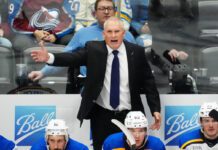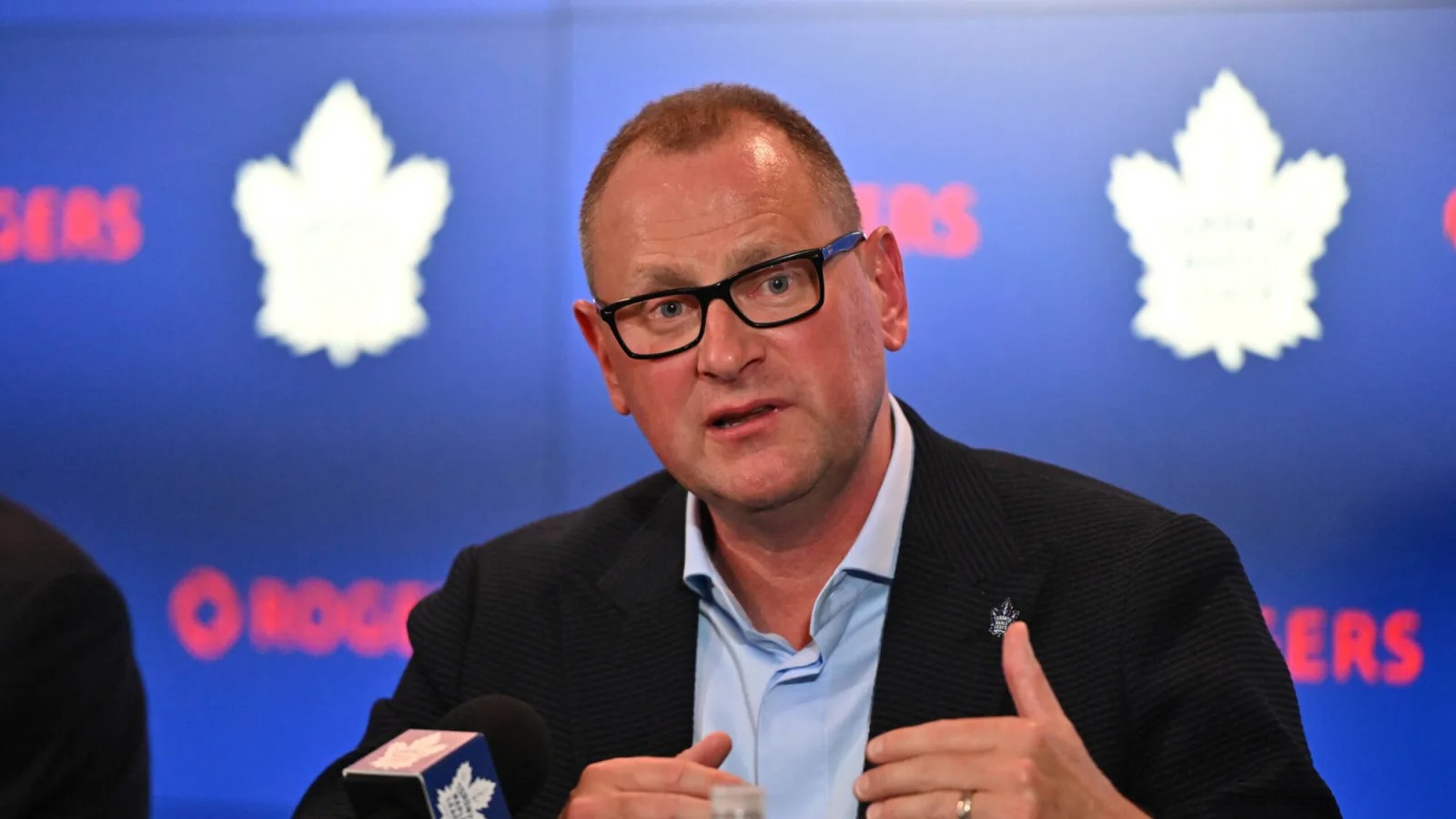After signing Auston Matthews to a four-year, NHL record-setting $13.25 million AAV contract, Maple Leafs GM Brad Treliving discussed the process of reaching a deal, his feelings on the four-year term, and his other remaining priorities this offseason.
Can you walk us through how the contract negotiations went and how you feel about them now that they are at their end?
Treliving: As I said when I first met with all of you at the first press conference, to me, number one was starting to build the relationship with Auston. There was a lot of change that happened. For Auston, he has been here a long time. Rather than rushing and committing to a contract, you have to get to know the people you are committing to.
I really enjoyed this process and the process of getting to know Auston. He is a remarkable young man. I’ve really learned through this process how smart he is. He takes in a lot of information. He is an independent thinker. He is very cerebral.
For us, it wasn’t necessarily a process of just going down and trying to hammer out a contract. It was giving him an overview of me coming in, where I see the team, the things we are going to try to do, getting his thoughts, and then having some general conversations about life while getting to know each other.
We went through that process, and then that dovetails into the business side of the contract. To me, this is a collaborative effort trying to find something that fits for both sides.
The bottom line is that you are talking about one of the world’s best talents. With the situation he was in, he could come in and demand a whole lot more than what he got. That’s just the reality.
To me, it was a partnership more than it was a negotiation. It took some time just to find a balance that worked for everybody. I applaud Auston. He has business to take care of as any player does, but he would come back to how it fits the team concept, how we can win, and how it fits moving forward.
It was a long process, but to me, it was one where the word I use is “partnership” and striking the right balance.
Auston Matthews used the word “balance” as well. When it comes to the term of four years, why were you comfortable with the balance for the team?
Treliving: We are in a little bit of a moving landscape here, right? Everybody knows where the cap has been in the last number of years. There are all sorts of predictions of where it could go. You are trying to separate fact from fiction here.
It is about striking that balance. They are all connected. Terms and dollars are all connected. We were trying to find something that worked for Auston — in terms of the dollar amount where it put him at the level he needed to be and where he deserved to be — and with how it overlapped with the team construct.
Auston was in a position where he could’ve come in and it could’ve been a lot more difficult. It is because of his leadership that we were able to get this done when we were able to get it done at the structure and dollar figure we were able to get it done.
To me, we have a year left on Auston’s current deal. We have four new ones after that. Five years in professional sports is a long time. We are excited for the next five years. We are excited to get this behind us.
When a player like Auston Matthews makes it a priority to get it done before training camp, what does it mean to his team, his teammates, and the whole organization?
Treliving: We all know where Auston sits not only within our team but within the league. This got done because Auston decided he wanted to get it done. That is the reality.
I want to applaud Judd Moldover’s work in this. We spent a lot of time going at it since I’ve gotten here. But it gets done because Auston says, “I want to get it done. I want it to be a non-issue. I want the focus to be where it needs to be, and that is one winning and putting all of our energies on the ice.”
That is why it is done. At the end of the day, he made that decision. To me, it is a sign of leadership.
There are some folks out there who are upset it wasn’t an eight-year deal. Undoubtedly, the number would’ve had to be higher on the AAV. Is it fair to say this is the type of deal that really helps the group as a team in the short term based on where the cap is now?
Treliving: I’d go back to that word I used earlier, “balance.” You’re absolutely right.
A guy once asked me, on a contract I was working on, “Are you close?” I said, “Yeah, we are getting there. There are only two issues… We just got to figure out the term and the money.”
That is all there is in these contracts. Two things: term and money. They’re intertwined. To me, we found that balance there.
You have to look at the landscape we are in. You have to look at the player. Where is the cap going? We all think and hope there is growth and significant growth over the next while.
It’s about trying to find that balance where it all fits and works for the player and you can continue to have flexibility to build around our best player. It works hand-in-hand. We just felt throughout this process that we landed on a spot where there was balance — balance in the number of years.
This contract is a big contract, but I remember his last one, too. People thought, “What is going to happen after?” We will deal with that when the time comes, but he just signed another contract.
Auston reiterated throughout the process that he is committed to the team. He is committed to the city. We landed on a spot that felt right and worked for everybody.
Can you give us an update on where things stand with William Nylander’s contract negotiations?
Treliving: I am not going to comment on contracts until they are done. We have one done, and now we will continue to work at William’s.
William is a terrific player. He is a star. We want to keep the good players. We have time. William has a year left on his contract. We will continue to work away at it. Hopefully, when we have good news, we will be sure to share it.
What is left on your to-do list this offseason? There was talk about Sheldon Keefe in terms of an extension. Are you looking to add for this season from a player standpoint before training camp opens up?
Treliving: From a team standpoint, you look every day. When you get to this time fo year, it is quiet around the league, but we continue to look at ways to supplement our roster, whether it be depth or the like. We will continue to do that as we get closer to training camp.
As far as Sheldon, I have really, really enjoyed getting to know and really now working with Sheldon this summer. We have spent a lot of time together from the draft through to free agency. We talk daily about the team-building process and putting together his staff.
As we went through that process where I said Sheldon would be coming back, I was really impressed then, and I continue to be more impressed each day. We will continue to work and talk about things on Sheldon’s side to see where that gets to.
I can say that I have really, really enjoyed getting to know him. He is a terrific man and a terrific coach. We will see where that goes, and we will continue to pick away at things that could possibly help us.
Why did Ilya Samsonov’s situation get all the way to arbitration? How do you feel about your goaltending moving forward, and also the importance of picking up Martin Jones?
Treliving: You jammed a lot into that question.
How do I feel about our goaltending? I feel good about our goaltending.
I think Ilya had a really strong season last year. You have to remember — it’s like dog years — that in goaltending years, he is so young for a goaltender. He had his most productive year as a pro. I thought he had a terrific season. I think there is certainly growth there. I like the summer that he has had. He has been back in town for some time training. He’s had a good summer.
I think Joe Woll is a terrific young goaltender. I had a chance to see that last year in the limited time he had here. He made some starts in the playoffs. I went back and watched the starts he’s had, but I knew Joe coming in going back to his amateur career. I have seen him in the American league. I think he is ready to grab a hold on the job here.
With Matt Murray’s situation… We have some young goaltenders in the system, but they’re just that — they’re young — and it takes time. We don’t want to rush anybody.
I think adding Martin Jones was a real good add for us. It is the NHL — there is always competition — but it gives us depth at the position with a guy who has played and won a lot of games. I thought he had a real strong season with Seattle last year. It gives us a lot of experience.
I feel good about our goaltending. We have depth. We have experience. We have players who are just coming into their own in Ilya and a young player who is just starting to emerge in Joe.
As for the arbitration process: Sometimes there are myths about arbitration that it is this big all-out war where you stand up and throw rocks at each other for three hours. The reason it got to arbitration is that we couldn’t get a deal done. The idea is that you try to get a deal that works for both sides. We couldn’t do that through negotiation — not for a lack of trying on both sides — so you go through the process of arbitration. We are happy with the process.
It is a little bit unique when the first time that you meet your goaltender is at the courthouse. [Ilya and I] kind of joked about that. You try to educate quickly with Ilya that it is just the business side of it. We try to conduct our business professionally.
We had a good chat before. We had a good chat after. We have had many chats since. I don’t think anybody should worry about any arbitration scabs or scars lingering. It’s part of the process. We are through it. It’s behind us, and I am excited to watch Ilya this season.






























![New Leaf Anthony Stolarz on the opportunity in Toronto: “In Florida, I knew my role as a backup… Now, [Joseph Woll] and I are competing for starts… As a goalie, that’s all you can ask for” Anthony Stolarz, Stanley Cup win, now Maple Leaf](https://mapleleafshotstove.com/wp-content/uploads/2024/07/anthony-stolarz-sc-100x70.jpg)
